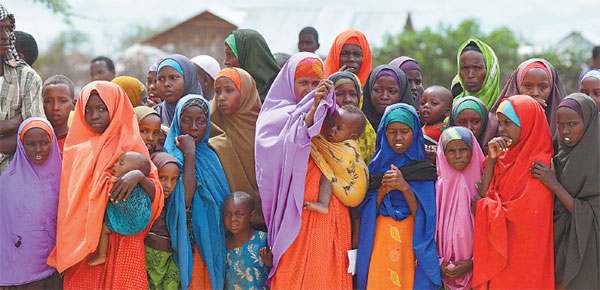Refugee camp provides opportunity
Young Somali students receive free schooling, get scholarships
Soon after dawn, Bashir Bilal sat outside on his usual plastic jerrycan surrounded by young girls and boys chanting Quranic verses.
Each child clutched a worn plank of wood instead of an exercise book, writing on it in Arabic script with ink made from charcoal and water.
In Somalia, the Islamic madrassa is often the only education on offer, but here in the Dadaab refugee camps, it is just the start. Later in the day, children can attend, for free, primary and even secondary school. Scholarships are available for college education.
Uprooted and dispossessed, life as a refugee is tough. But for the Somalis who have for years, or even decades, called Dadaab home, there are opportunities, too.
Bilal, 47, used to live in Afgoye, a breadbasket town 30 km northwest of the capital, Mogadishu. When he came to Dadaab five years ago, he found better schooling options than at home, where fees were high and children would often spend their days helping out on the family farm.
"Children here in Dadaab have the privilege of better education," Bilal said. "They will bring change in Somalia when they go back."
Just when they will go back is contentious. Kenya's government has hosted refugees from Somalia since 1991, when civil war tore the country apart. Since then, Dadaab has grown into the world's largest refugee settlement, with over 350,000 residents.
Kenya now wants the camps shut down, claiming they are a security threat used by members of the Shebab, Somalia's al-Qaida branch, for recruitment, training and downtime.
Albert Kimathi, the area's top government official who is responsible for security as deputy county commissioner, described Dadaab as "the breeding ground, the training ground" for Shebab. "They use the camps as safe havens," he said.
People living in the camps find such allegations perplexing.
"This is not the place they are recruiting," said Yakub Abdi, a 29-year old father of two. His 260 fellow volunteers in the Community Peace and Protection Team keep tabs on new arrivals to their camp, reporting anyone suspicious to police.
"Shebab are not here," Abdi said.
|
Refugees watch the arrival of Antonio Guterres, United Nations high commissioner for refugees, at the Dadaab refugee camp on May 8. The refugee camp currently houses about 350,000 people and for more than 20 years has been home to generations of Somalis who have fled their homeland. Tony Karumba / Agence France-Presse |



















